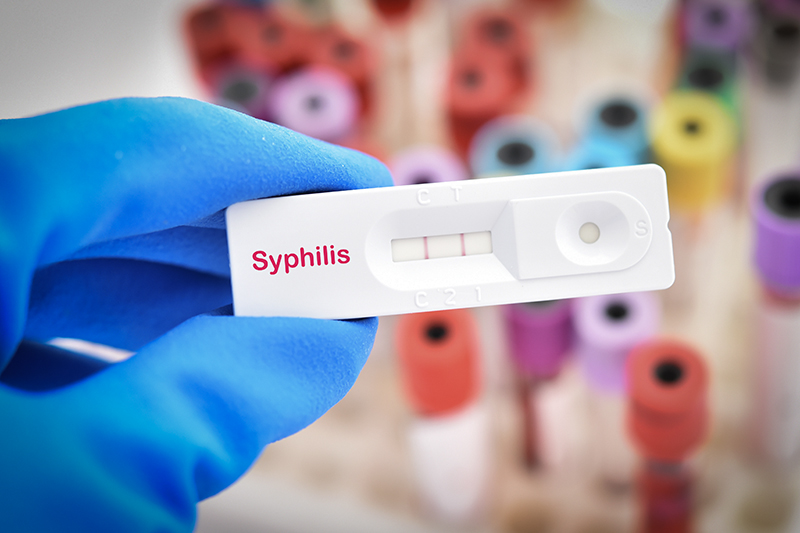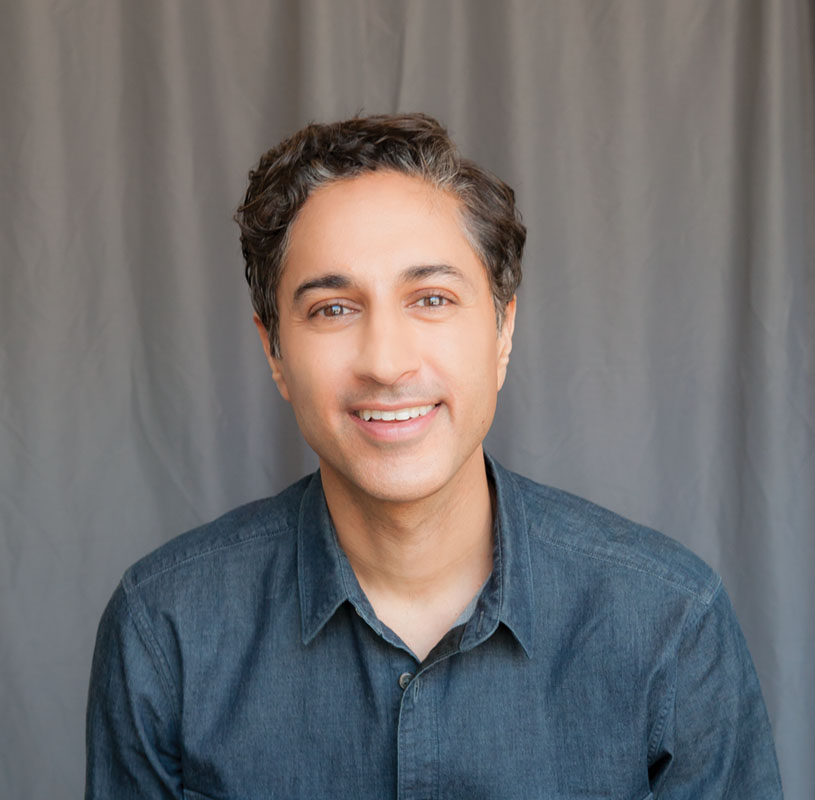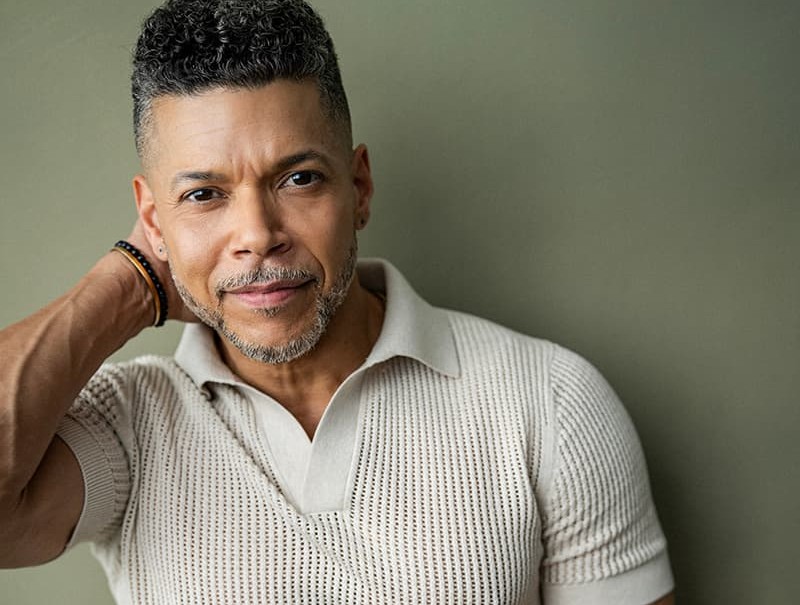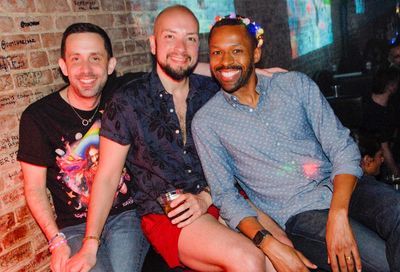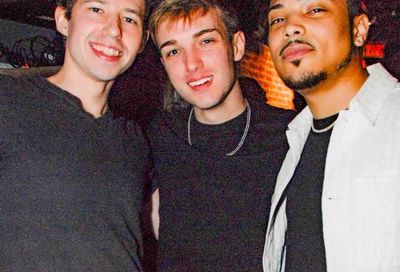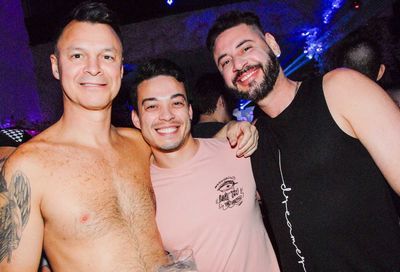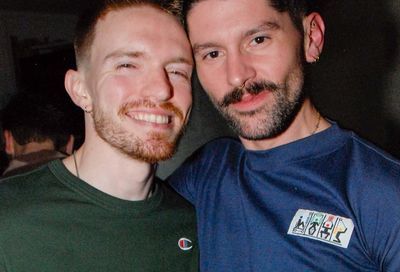Wonder Women
Courtney Snowden and Sheila Alexander-Reid said goodbye to the private sector and hello to serving the public good.

In January, new D.C. Mayor Muriel Bowser tapped Sheila Alexander-Reid, a former event promoter and longtime community activist, to lead her Office of GLBT Affairs to deal with any issues that affect the wellbeing of D.C.’s LGBT community. Bowser noted that Alexander-Reid had the “extensive background championing rights for lesbian, bisexual, gay and transgender people all across the District.”
Then, on April 1, the Mayor selected Courtney Snowden, a former candidate for D.C. Council and lobbyist for progressive or Democratic-leaning policy issues, as Deputy Mayor for Greater Economic Opportunity. Tasked with revitalizing and spurring the growth of businesses in underserved and downtrodden neighborhoods throughout the city, Snowden became the highest-ranking LGBT official in the District.
Both women bring unique traits to their roles. The effervescent, upbeat Snowden, a D.C. native, uses optimism, personal drive and impressive policy knowledge to help the wheels of government move faster and more efficiently. The outspoken, focused Alexander-Reid, born in Cincinnati but raised in Bethesda, brings her experience in the private sector, her strong leadership abilities and a sense of the “fierce urgency of now” from her activist days when it comes to using her position to advance and sustain LGBT rights across the District.
To Snowden, Alexander-Reid is a qualified, dedicated individual, a “great addition” to the administration. She admires Alexander-Reid for having given up a more lucrative private-sector career to lend her talents to the cause of making the District a better place to live. To Alexander-Reid, Snowden is a smart, independent strategist who “thinks outside the box” and arrives at innovative solutions. “She’s the type of person you want to be around,” says Alexander-Reid, “just to have some pieces of wisdom fall off and hope you can catch them.”
As high-ranking African-American women in only the second D.C. administration headed by an African-American woman, Snowden and Alexander-Reid recognize the gravity of their positions in government — in particular, the importance of serving as role models for both African-Americans and LGBT youth, just as Tammy Baldwin was for Snowden, who served as the then-congresswoman’s staff assistant on Capitol Hill.
“The opportunity to be what Tammy was for me to some young woman who is struggling to figure out that she can be anything that she wants to be, no matter her sexual orientation, no matter her gender, no matter her race, is a humbling reality,” Snowden says. “I think I can be that for someone. It’s one reason I took this job.”
Snowden and Alexander-Reid also have ties to DC Black Pride, which celebrates its 25th anniversary this weekend, with the former having served as its president and the latter as a board member. Both see the annual celebration as important to affirming people’s dual identities as both black and LGBT and to passing on the legacy and accomplishments of the organization’s veterans.
“With the gains we’ve made in the movement, we no longer look for affirmation in that one place,” Alexander-Reid says. “We can get affirmation in many places now. But does that mean that you no longer need it? Yes. You do need it. When people are young and coming out, they need to see there are older black people who are gay and successful. [We] need to be able to pass the baton.”
“That empowerment, the upliftment, the opportunity for young people to see a community of people that are doing incredibly well, that are productive, that are positive — you can’t beat that,” echoes Snowden. “That’s what Black Pride does.”
Not many administrations would choose to harness the powers of both Courtney Snowden and Sheila Alexander-Reid. Yet that is precisely what Mayor Muriel Bowser did when selecting these women, both prominent figures within D.C.’s LGBT community.
They are truly two of her administration’s wonder women.

COURTNEY SNOWDEN
Deputy Mayor for Greater Economic Opportunity
METRO WEEKLY: Let’s start by talking about your new job and what it entails.
COURTNEY SNOWDEN: It’s a newly-created position. The mayor realized there are communities all over the city that are overlooked and underserved and she needed someone to focus across the city on that. I get to think about how we rebuild and revitalize communities for residents who have been here, as the Mayor would say, “for five minutes,” and as I would say “for a hundred years” and every amount of time in between. So I really focus on building community in a way that respects the people who have been there and helps to keep them in the community, building the economic ladder so that they can stay in the community, after it begins to improve and change in a positive way.
MW: What sort of businesses are you looking for, because one of the things raised in the last campaign was the need for diversification in terms of industry.
SNOWDEN: A lot of people think when I talk about development I’m just talking about retail. I’m not. I’m really talking about revitalizing and redeveloping communities in a way that allows people to enjoy the great beauty and culture that D.C. has to offer. The reality is everyone wants a clean grocery store. Everyone wants a sit-down restaurant and things they can walk to. Everyone wants to feel safe in their community, everyone wants excellent public schools and public charter schools. Everyone wants beautiful parks to play in. That’s the type of development that we’re talking about.
The city’s done a lot over the years in terms of libraries and recreation centers. There’s more to do, but we’ve got a number of beautifully built new libraries and recs. What we don’t have in some of the more challenged areas are just the basics that people take for granted in other parts of town. So we want to build that.
MW: You ran for an at-large seat on the Council in the last election. What was that experience like?
SNOWDEN: Well, I would say it ended perfectly fantastically, right, because I got a great gig out of it, and an opportunity to serve the city in the way that I talked about on the campaign trail. You know, being a native, sometimes you can forget that you actually don’t know every nook and cranny of the city. I know a lot, but I don’t know every single one, and so having the opportunity to talk to residents in every part of this town was a really interesting and unique experience.
What I’m most proud of, though, is how we were able to galvanize support in a remarkably short period of time. I think I was the last person to get in the race and part of the reason I did so was because we were no longer going to have a member of the Council who was openly gay. In a city like D.C., I think it’s still critically important that an openly gay member of the Council is at the table. Tammy Baldwin and others have said over and over again, “If you’re not on the table, you’re on the menu.”
MW: Do you think that’s a great loss at this point, to go from two to none?
SNOWDEN: I do think it is a loss, but I don’t think it’s just a loss for the LGBT community. It’s a loss for the city. One of the most amazing things about this place is the great richness and diversity, and I feel like everyone should be represented. It still blows my mind that we haven’t had a Latino on the D.C. Council. Or Asian-American. Or Ethiopian-American. We have a significant Ethiopian population. The point is we have such rich diversity, and our council, our political system has yet to become reflective of that.
MW: When the campaign ended and you didn’t win, what was your thought process to your next step?
SNOWDEN: I didn’t know what my next step was going to be. I had been at the Raben Group for eleven years. I had a very comfortable and safe, productive home there. Robert Raben has been a mentor and a friend, as well as a boss to me. I knew that I could continue to do amazing work there and thought that I would. I had no intentions of coming into government. Then the opportunity was presented to me and it was just too great of an opportunity to pass up.
MW: How was it presented to you?
SNOWDEN: I was actively involved in the transition, and I served on the Education Transition team. I participated in helping to identify talent for the various positions, and I was having coffee with the Director of the Mayor’s Office of Talent Appointments, Steve Walker, to give him names of people who I thought might be great for this job. We started to talk and I thought, “Hmm, why not me?” He may have said it first, but I was thinking it at the same time. [Laughs.]
And I started to think about what the real opportunity here would be to serve. To serve government, to serve under Mayor Bowser and her administration. And what I had been most motivated by was the opportunity to bring some of the innovative experience and creative ideas that I had in the private sector into government. When Mayor Bowser calls you, it’s very hard to say no to her. I couldn’t even imagine saying “No.”
MW: What do you think she saw in you?
SNOWDEN: I’m cute. [Laughs.] That’s actually a question for her. But what I hope she saw in me was what so many see in her, which is a real commitment to bring the types of change to the city that people have talked about for many years but haven’t done anything about. I hope that what she saw in me was that I’m not driven by ego, I’m not driven by having my name on the door, that I really care about the people of this city.
I really do love D.C. My family helped build this city. My great-great-great-great-great grandmother owned Ft. Stevens and sold it to Lincoln. We’ve never been paid. [Laughs.] Apparently you can’t sue for that $6,000 plus interest. But my family built this city. We helped protect it from the Confederacy. And to watch the changes happen has been both phenomenal and disheartening, and to have a part in making sure that every single resident gets to benefit from all of that is too great of an opportunity. I hope she saw my commitment to that.
MW: What about D.C. inspires you?
SNOWDEN: D.C. is such a wonderfully diverse town. We have the opportunity to interact with people who both literally control the world, literally make decisions that impact the world, literally run programs that change, improve and challenge the status quo in the most positive ways.
And at the same time we have a city where the Frederick Douglas can sit next to or across the street from what is a community that has real historic relevance and real relevance today but where people [struggle] to make ends meet and at the same time have a real spirit about them –- love the city, love the culture and want people to understand who they are. To me, that’s phenomenal. The types of opportunities I have for my 6-year old growing up, I can’t give him that anywhere else in the country. I don’t think in the world. And I wouldn’t raise him anywhere else.
MW: What’s still disheartening about D.C. to you?
SNOWDEN: A couple of things. For decades we’ve had an unequal school system. For too many years, schools in different parts of the city just have not performed. There’s lots of reasons for that, so I’m not assigning blame to any one group of people, but that’s disheartening. We haven’t solved that problem. With a city with such great wealth, such great education, at one point 13 colleges and universities, we haven’t cracked that nut — that is disheartening.
That we have seen development sprout up and buildings grow and retail grow and restaurants grow and people really figure out and jump in and we have a high entrepreneurial spirit, that’s phenomenal. The fact that we haven’t seen that same thing take hold east of the river is disheartening. The fact that I grew up in a community where city services were doled out almost perfectly, and now I live in a community where I have seen government ignore and isolate communities in really significant ways, that’s disheartening.
But what’s exciting, what I’m enthusiastic about, what I’m passionate about, is changing that paradigm, finally. The Mayor’s vision for what can happen in every single ward and all eight wards really motivates me. Her passion for making sure every single resident gets to be prosperous if they work hard. If they work hard with that vision for this city, I can get behind that, but I wanted to do more than just get behind it. I wanted to put my money where my mouth was, too. I wanted to stop complaining, really roll my sleeves up and do something about it.
MW: This may be premature, but do you ever think that maybe one day the word “Deputy” will come off your title?
SNOWDEN: I hope when you write this article, you say I almost choked on my water. No, I don’t. Let me tell you something. I’m exhausted. And I’ve only been here a month. I have watched Mayor Bowser up close and personal. I have watched her campaign. I have watched her be Mayor. I’ve watched her day start before the sun rises and end long after the sun goes down, and I have no idea how she does it. None. There is not a harder working human being. I’ve never seen anything like it. To have to follow that in 10 years, in 20 years, 30 –- I don’t know if I could do it ever. I think the challenge I have right now is a pretty awesome one and the order is tall, and so right now I think I’m going to focus on that.
MW: This weekend marks Black Pride’s 25th Anniversary. You’ve previously served as its president. What does the event mean to you?
SNOWDEN: Black Pride means so much to me, and that it’s in its 25th year is mind blowing to me. You know, so many black LGBT folks around the country find themselves in isolated communities that aren’t validating. Over time that’s changed, and I would say that’s in part because of the Black Pride movement. And the work that so many, including Earl Fowlkes, have done. But for me, the reason why Black Pride is such a critically important time every year is because it’s the one time where we all come together and nothing matters. We get to celebrate just being ourselves.
That empowerment, the upliftment, the opportunity for young people to see a community of people who are doing incredibly well, that are productive, that are positive — you can’t beat that. And that’s what Black Pride does. That’s what Black Prides all across the country are doing, but it’s what DC Black Pride does well in particular, because it’s so big. DC Black Pride puts on a fantastic event every year that’s focused on both touching the spirit, educating the community, and letting them let their hair down and party, too.
MW: Finally, what makes you the most proud in your life?
SNOWDEN: My baby, Malik. He’s six. He came to me when he was 18 months old. He was born to two teen parents who are native Washingtonians. They came from very difficult circumstances and his mother and I struck up a relationship and agreed that I would take him. He has driven, in the last five-and-a-half years, literally every decision I’ve made. Me becoming even more active in local politics and local issues is really about creating a better world and community for him here. I am most proud to be his mom. My mother used to say stuff like that and I’d go, “Shut up.” But you know, there is this thing that happens to you when you are responsible for a human that makes you look at the world differently. I am most proud to be Malik’s mom. Most proud to be responsible for creating a better world for him. And now I’m responsible for creating a better world for all the Maliks in the city.

SHEILA ALEXANDER-REID
Director of the Office of GLBT Affairs
METRO WEEKLY: What is the thing you like most about most about your new government post?
SHEILA ALEXANDER-REID: I like the fact that I am getting paid to do what I love to do, which is help my community. Not only that, but I have much more power to be much more helpful. I have authority from the District government to provide services and to see that services are being rendered properly. I have access to the mayor if there’s an issue that needs to be brought up to her attention. So it’s sort of the opposite side of the fence, being an activist outside trying to get attention to make change. I can actually make change from the inside.
MW: Explain your job for us.
ALEXANDER-REID: [Laughs.] So many people ask me that question. There are two or three things that make up my job. One is making sure that the entire administration is trained on LGBT competency. My deputy Terrance Laney and I do that every other Friday. So just like it’s mandatory that they take ethics training, it’s mandatory that they take LGBT competency training. So you can imagine a room with somebody from parks and rec, public schools, motor vehicles, D.C. library, you’re teaching them what the word LGBTQ means, gender identity, sexual orientation, gender expression, why gender-neutral bathrooms are requested so many times, things like that. It’s really not to enlighten them so much as to let them know that, by law, they have to treat this community with respect when they come to them for services and let them know that they have certain entitlements just like any other resident.
Another thing that I do is make sure that the community is aware of the mayor’s priorities and the changes she’d like to make within the city as it pertains to them. Last but not least, my job is to make sure the mayor knows what the community’s needs are and would like to see done.
There’s actually a fourth thing, and that would be that the LGBT community knows that if there’s an issue that they have with any government agency, they can call me and get help with that. So if you’re at motor vehicles and someone’s giving you a hard time because you look like Joe but your ID says Jane, call me and I will get on the phone with motor vehicles and explain to them the law. If there’s a problem when your trash didn’t get picked up, you can call the Mayor’s Office of Community Relations and ask them about it, or you can call me if you’re an LGBT constituent because that’s what we are, sort of constituent services. That’s what I’m here for. And not just on Pride Days but, you know, 365 days a year.
MW: As a person who’s entered government from the outside, what have you found in those competency trainings? Are you alarmed at the ignorance that people have, or the education that is needed to work with the LGBTQ community? Or are you surprised at how far they are already there?
ALEXANDER-REID: It’s really enlightening for me to realize that the mainstream world has come a long way. I typically expect to get some negative feedback and we haven’t, and I’m pleasantly surprised at how sensitive they already are. Not everyone, but the majority of the co-workers who are in these classes, either they know the rules already or they have no problems when I tell them the rules and the laws that they have to follow. There may be one or two who, for religious reasons, have some issue with it — I don’t have a problem with that. You know, Terrance and I say the same thing when we get to the end of the training: We’re not here to change your views on religion, we’re not here to recruit you, and we’re not here to ask you to make any changes in your moral values. We’re here to tell you what the laws are and make sure you follow them.
MW: What is the most rewarding part of your job?
ALEXANDER-REID: When somebody calls me or comes into my office and says, “I’m a transgender woman and I’m homeless. Can you help me?” Or a young transgender boy will come in and say, “I’ve just been kicked out of my home and I have nowhere to go and I was told to come to your office. Can you help me?” It’s rewarding to hook up citizens with services and opportunities that I don’t think the LGBT community knows about. It’s what gets me up in the morning. And that’s the most rewarding part of my job — to do the work that helps change lives.
MW: What is the most frustrating part of your job?
ALEXANDER-REID: I will say that coming from the private sector, I’m used to getting things done fast and quick. Government takes a little more time. But when it happens, it can be that much more meaningful. So I’ve learned to be patient, and that’s a plus.
In a government structure, I just can’t just call the Mayor and say “I need this done. Can you do this for me?” I have to let my boss understand why it’s important and she lets her boss know why it’s important and somebody along the line will come back to me and say, “Sheila, you’re right, do it.” That may take a couple of weeks or a couple of months, depending on what it is. But ultimately it gets done, and it gets done in such a way that you have the power of the entire District government behind you.
MW: You’re black, you’re lesbian, you’re in a seat of power at the government level. What does that mean to you?
ALEXANDER-REID: It means that the stars have aligned, finally. I spent a lot of time on the outside, railing against the machine, but now I’m on the other side of the fence, so I can make a lot of change. And I know what changes need to be done. So it means that, at last, I’ve been given the opportunity to create change at a much higher level.
It also means that the world is changing. Just like we have an African-American male President, we have an African-American female mayor who is smart as a whip — and I’m not just saying that because she hired me, I’m saying that because I work with her, and I see her in action and I’m quite impressed. Not only is she hiring people who are smart, people who are capable, but her eyes are wide open to casting a wide net. So when people say she’s hired Courtney Snowden, she’s hired Sheila Alexander-Reid, Steven Walker, all these people in high prominent places. It’s not because we’re gay, it’s because we’re good, and she knows that. So that feels awesome. Because we’ve been good for a while, but nobody ever recognized us at this level. So to have that sort of power and to have that sort of support from the mayor and backing from the mayor — the sky’s the limit as far as change you can create.
MW: You worked for 30 years at the City Paper in the private sector. Did you expect at any point in your life to be here?
ALEXANDER-REID: No. That’s the crazy thing. I never expected it. I thought I’d be in sales my entire life. I was making a move from print sales into digital sales. That was my goal. And it just so happened that I moved to the Washington Blade from the City Paper to head up their digital sales, and three months later, I’m here. There’s no way I could have predicted this. If you had told me I would be here, I would say “No, because I don’t even want that job.”
This is not my first go-around with this position. I was offered this job under the Fenty administration and I applied for the job in the Williams administration. Mayor Anthony Williams, in his brilliance, went with a good friend of mine, Darlene Nipper. I can’t be mad at that. It wasn’t my time. I stayed at City Paper. Mayor Fenty came along and encouraged to apply, and I didn’t. I talked a lot to a lot of people and I was encouraged, and I was this close but something held me back. It wasn’t my time. And now that I’m in the position, it all makes sense. This is the time. I had to evolve into the Sheila I am now in order to do the job that I have now. Everything happens for a reason, and this is divine intervention.
MW: You’ve been involved with Black Pride as a board member. What is your favorite memory of a past pride?
ALEXANDER-REID: CeCe Peniston on the stage at Banneker Field. I get goose bumps just thinking about it. I brought her here because I was a party promoter at the time. So she was performing for me at a club called the “Zei Club” on 14th — a huge club — that Sunday night. But on Sunday day, because she was already performing for me, I made sure that she was able to perform at Black Pride because I was friends with the organizers as well, and because it helped them have a huge headliner like that at the concert. So it was an amazing, amazing feeling to have this top headliner from the radio singing “Finally” on the stage and I’m looking out at this crowd of thousands, feeling affirmed because she gave the kind of love to that community that was no necessary. And to know that I was part of providing that was just amazing.
MW: That was the year it didn’t rain.
ALEXANDER-REID: It did not rain. And it rained almost every year up to that and even after that.
MW: With Black Pride celebrating its 25th Anniversary, talk about why it’s important event for the community. There are some who questions the need for a Black Pride.
ALEXANDER-REID: What you have to remember that Black Pride was started because we were not necessarily included and welcome at Capital Pride. We felt a sense of isolation. We weren’t at the table, we weren’t the decision-makers, we were an afterthought. For years. And so somebody said, “Hey, why don’t you all do a Black Pride?”
The point is we started that because we needed a place where we could celebrate our blackness as well as our gayness. So it’s kind of like gentrification of Dupont Circle. It’s not the gay hub it used to be, because we’ve made the entire city gay-friendly, correct? So you lose a little bit. So you lose a little gayness, but you’ve gained a gay-accepting city. That’s how I see Black Pride. We come to be affirmed and to affirm each other. We come to bond and celebrate.
MW: What does Black Pride mean to you personally?
ALEXANDER-REID: That may be the toughest question you have asked me. Black Pride. You know, I heard these young — when I say young, 30-something-year-old activists last night at Black Pride sum up very, very well. And I want to give them credit. But they are “unapologetically black and unapologetically gay.” And that sums it up. You can’t separate the two. I’m not going to ask you to accept me. I’m going to demand that you accept me. That’s what Black Pride means to me.
For information on the Black Pride Weekend events, visit dcblackpride.org or call 202-347-0555.
Support Metro Weekly’s Journalism
These are challenging times for news organizations. And yet it’s crucial we stay active and provide vital resources and information to both our local readers and the world. So won’t you please take a moment and consider supporting Metro Weekly with a membership? For as little as $5 a month, you can help ensure Metro Weekly magazine and MetroWeekly.com remain free, viable resources as we provide the best, most diverse, culturally-resonant LGBTQ coverage in both the D.C. region and around the world. Memberships come with exclusive perks and discounts, your own personal digital delivery of each week’s magazine (and an archive), access to our Member's Lounge when it launches this fall, and exclusive members-only items like Metro Weekly Membership Mugs and Tote Bags! Check out all our membership levels here and please join us today!





